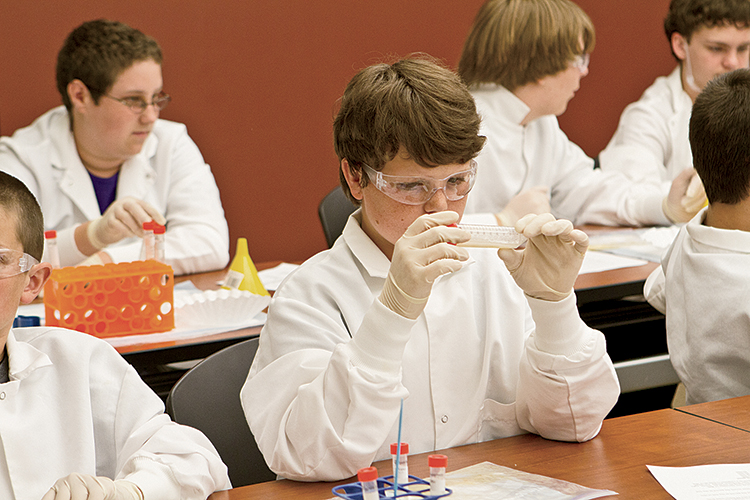Home > Oklahoma > Oklahoma Ag Education > Noble Academy Connects Food and Farm
Noble Academy Connects Food and Farm

One of the Noble Foundation’s newest efforts helps kids connect the dots between agriculture and how they live.
The concentrated effort to bring greater awareness to agriculture and its impacts began in fall 2012. At that time, The Samuel Roberts Noble Foundation established the Noble Academy, a youth education and outreach function.
“There is a real disconnect between youth and agriculture,” says Dr. Frank Hardin, the foundation’s educational outreach manager. “As these students get older, they become future policy leaders, educators and decision makers. If this disconnect continues, agriculture can suffer some real consequences in the future.”
The Noble Academy improves agricultural and science knowledge through classroom instruction and on-campus experiences, says Steve Rhines, vice president, general counsel and director of public affairs. The organization also informs students about the need for research to advance agriculture. And they communicate the range of career opportunities available.
“Most kids and many adults associate agriculture to a farmer or a veterinarian,” Rhines says. “In reality, it’s just about anything you can think of as far as a profession.”
The Noble Academy’s Women in Science Program introduces eighth-grade and high school girls to different careers in science. Literature presents examples of women in science roles such as agricultural consultants, lab technicians, educational coordinators and plant breeders.
Meanwhile, the Noble Academy’s classroom instruction provides hands-on science curriculum in Oklahoma schools with an agricultural slant in middle and high school grades.
Students may model the rock cycle using crayons or extract iron from cereals to learn about this essential mineral’s impact on human and plant life.
“For any student that’s interested in food, feed and fiber, the critical age to reach out to them is middle school,” Hardin says.
The Noble Academy’s annual Science & Ag Day attracts 300 eighth-grade students to the Noble Foundation campus to experience a variety of agricultural science topics, such as horticulture, plant breeding and ruminant digestion. Similarly, the Science Carnival provides hands-on chemistry demonstrations for about 250 high school students.
Valuable partnerships with several organizations help reach exponentially more students. A project with the Oklahoma Farm Bureau established the “Grown for You” mobile classroom, an education trailer. The classroom on wheels regularly reaches grades two through eight with videos, presentations and interactive games presented on 47-inch outdoor TVs. The mobile classroom engages broader age groups at county fairs and other events.
Likewise, collaboration with the Oklahoma FFA carries great potential, including a means to incorporate science-based curriculum and credit into agricultural coursework at schools.
Education has served as a cornerstone of the Noble Foundation since its inception in 1945. The foundation started in the post-Dust Bowl era to educate farmers and ranchers. Over the years, foundation staff members also have been passionately engaged in youth education. Now, the Noble Academy establishes a successful structure for these education and outreach efforts.
In fact, the Noble Academy reports that repeat visits to classrooms are met with excitement. Good rapport with school administration fosters a promising future. And educator feedback indicates a desire for more.
“We are seeing a trend that says, so far, our students are hungry for agriculture-related curriculum,” Rhines says. “Now we are developing an evaluation and assessment program to measure Noble Academy’s impact.”



